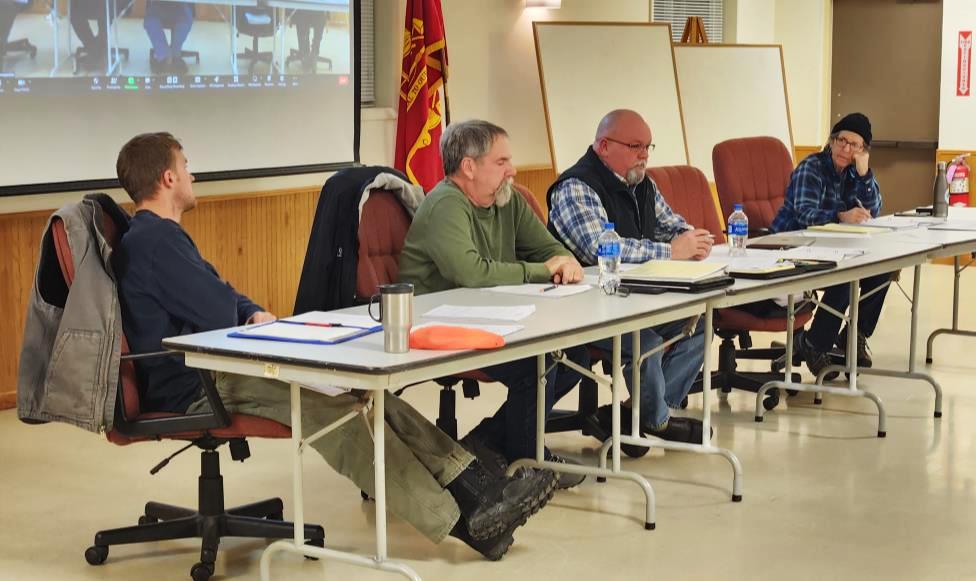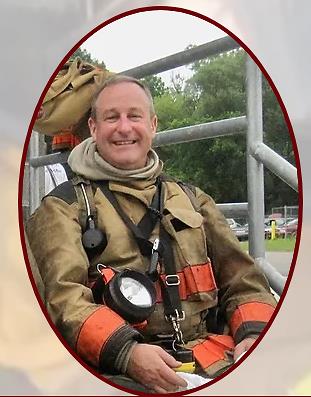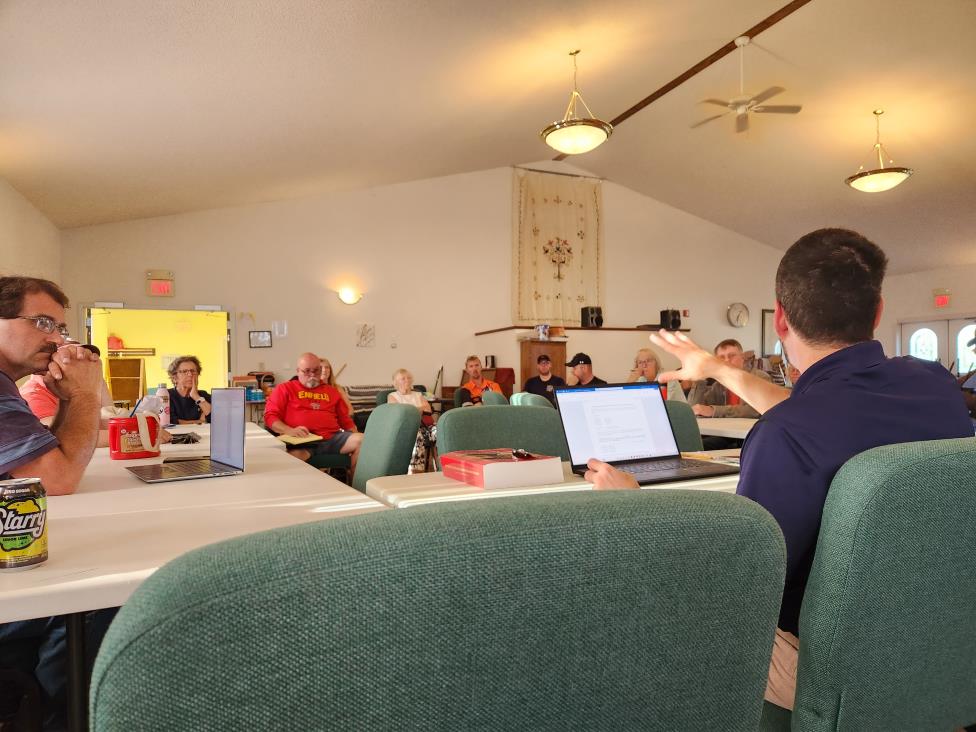Fire Commissioners trade 20-year bonding for shorter terms, fewer trucks

by Robert Lynch; January 24, 2024
Anyone who’s covered the newly-formed Enfield Board of Fire Commissioners both this year and last can sense a recent shift in political winds. And for this writer, attending the Board’s latest meeting January 23rd felt at times like waking up from a bad dream that had caused your psyche so much angst for no good reason. The dream was last year. The relief is now.
This year, the Commissioners’ meeting place has changed. The sometimes-snarky, heavy-handed legal guidance has disappeared. And a more congenial, less-adversarial mood has taken hold. One feels the Enfield community is now working together here, and not—at least not in this instance—at cross-purposes.
Sweeping aside legal advice from the past, Enfield’s four attending Fire Commissioners Tuesday informally, yet firmly, agreed to rescind last fall’s decisions by their predecessor Board, decisions that would have bonded two fire trucks for as long as 20 years. In principal alone, the earlier agreed-to long-term obligation would have saddled Enfield Fire District residents with $1.05 Million in fire apparatus debt for two decades.
Instead, the newly-reconstituted Board made clear it intends to bond only the newer, more expensive $825,000 pumper engine, the one purchased last year. And the Board would bond it for no longer than ten years, maybe for even as few a number of years as seven.
It was “too long, too much, and doesn’t work,” Board of Fire Commissioners’ Chairman Greg Stevenson told fellow attendees Tuesday, Stevenson relaying the advice of the Board’s new legal counsel, Mark Butler. At their prior meeting, Commissioners retained Butler to replace attorney Brad Pinsky, to whom they unapologetically showed the door. The Town Board, not the fire service, had recruited Pinsky last year to shepherd Enfield into formation of a Fire District. And it was Brad Pinsky who’d most persuasively advocated for long-term bonding of fire trucks.
Pinsky’s initiative, applauded by several previously-appointed Commissioners no longer on that Board, led voters to approve narrowly the two trucks’ bonding in a closely-decided referendum last October. Both the new pumper engine, as well as a 2020 tanker truck, the latter vehicle already partially paid off, were set to go the bonding route.
But with Pinsky gone, and with Mark Butler the lawyer having earned Commissioners’ newfound trust, the Board Tuesday made an abrupt—and largely unexpected—course correction. No votes were taken that night. But votes will come later. And the Board’s new direction stands undeniably clear.
The new consensus directs that the Fire District not bond the less-costly of the two vehicles, the tanker. Instead the District would pay off the tanker’s remaining loan year-by-year. Members pointed out that the tanker’s current loan carries a lower interest rate than that of any bond they would likely secure for it.

And as for the more expensive pumper engine, all four of the Commissioners present Tuesday indicated no interest in bonding it for longer than ten years. Three Commissioners said they’d consider paying the truck off in just seven years.
Attorney Butler had given Commissioners a five-year bonding option as well. but Stevenson discarded that choice, conceding that a half-decade payoff would impose too much short-term taxpayer pain. Nobody supported a 20-year payback, like what Pinsky had proposed.
“I’m more comfortable with ten years,” Commissioner Robyn Wishna said. And she added, “it’s a great idea not to bond (the tanker).”
Wishna also suggested that the Board investigate securing one-year Bond Anticipation Notes for the pumper. Wishna raised the prospect that interest rates may fall before the truck’s longer-term debt would later be locked-in with a multi-year bond.
Stevenson said he believes the Board can make the revised financing decisions work within this year’s Enfield Fire District Budget. He’d move money around to make the changes match the numbers. If the pumper were bonded this year, Stevenson indicated, its first bond payment wouldn’t come due until 2025. And any money the budget had set aside this year for bonding could be directed instead toward retirement of the tanker’s soon-to-sunset bank loan. That loan remains a relative bargain; holding an interest rate of just 3.74 per cent.
On the other hand, Butler estimates bonds may carry interest of about four per cent. Last year’s initial loan on the pumper, secured by the Enfield Volunteer Fire Company (EVFC)—which the Enfield Fire District now oversees—carries a much-higher, 5.74 per cent interest rate.
Stevenson remarked that the 3.74 per cent rate is “one more reason not to bond the tanker.”
And to get the tanker fully-paid, Commissioners would only need to come up with $72,449 in each of three years: 2024, 2025 and 2026.
Stevenson’s logic is straightforward: “Let’s save the most interest that we can while still meeting our obligations.”
The Enfield Town Board transferred fire service oversight from itself to a newly-formed Fire District in August of last year. The Town Board then appointed the District’s first five Fire Commissioners, as New York law demands it must. Of the five appointees, only three of them later stood for election to become permanent Commissioners. And only two of those three later won in last December’s Fire Commissioners election. Therefore, 60 per cent of the Commission’s membership this month is brand new. And four of the five members, including recent Fire Chief Stevenson, are fire service volunteers.
Robyn Wishna and Enfield Highway Superintendent Barry “Buddy” Rollins remain the only hold-overs from the originally-appointed Board. Rollins did not attend Tuesday’s meeting, his absence likely due to his Department’s attention to a nuisance snowstorm that made Enfield roads that night treacherous.

Two former Commissioners who chose not to seek election, Geoff Hollister and former Chairman Jim Mathews, became last fall’s loudest cheerleaders for long-term fire truck bonding. Mathews most adamantly promoted long-term financing so as to avoid a sudden, painful, escalation in fire taxes.
In a district-wide referendum held last October 31st—one which drew criticism for having been called on short notice and scheduled on Halloween—Enfield residents approved, by a vote of 77-69, the purchase of the pumper engine from the EVFC and its subsequent bonding for up to two decades. By an almost identical margin (79-66), voters also supported the tanker’s purchase and bonding of its $220,000 estimated unpaid balance. In some circles, the closeness of the outcome amid the circumstances led to post-election public bitterness.
Although the voters last year directed the bonding of both trucks, Stevenson indicated after Tuesday’s meeting that Butler would likely conclude that Fire Commissioners can legally back away from the referendum’s financing choices should they choose to do so.
Stevenson forecast that bonding for the pumper could come as soon as “late-February or early-March.” The chairman plans to convey board consensus to Butler, who could firm-up resolutions in time for a Commissioners’ vote as soon as February sixth.
One nagging question was never answered before the Halloween referendum. Now it somewhat has been. The question involved how much additional money bonding either or both of the fire trucks might cost Enfield over the long run. Attorney Butler has finally assembled some numbers.
On a spreadsheet Stevenson shared after Tuesday’s meeting, the newly-retained attorney projected that 20-year bonding for the pumper alone would, assuming a bonding interest rate of four per cent, add $346,703 to the pumper’s $825,000 price and heighten its overall taxpayer cost to nearly $1.2 Million.
By contrast, ten-year bonding would put the truck’s total cost at just over $1 Million. Seven-year bonding would trim it to $957,000. Were the Commissioners to opt to bond for only a half-decade, the number would shrink to $924,000.
But as any homebuyer knows, the downside of short-term financing is a higher yearly payment. A 10-year bond at four per cent would only drain $115,500 from the annual fire budget; a seven-year bond just over $150,000; and a five-year bond considerably more.
The five-year option has its advantages, Stevenson acknowledged, “but we don’t have the budget.”

Enfield’s new crop of Fire Commissioners has tactfully chosen not to air complaints in open session. Yet members have implicitly made clear their dissatisfaction with the direction in which Brad Pinsky had pointed the Enfield Fire District during its earlier, formative days. At its organizational meeting January 9th, Commissioners directed their Secretary to write Pinsky that “his service is no longer needed by the District.”
At that same meeting, the Board replaced a policy manual that Pinsky had provided the appointed Board last fall with an alternative manual employed by the Enfield Fire Company.
At a late-October Commissioners’ meeting, Stevenson had described the cut-and-paste Pinsky submission in plain-spoken language he felt pressure later to retract. Yet he held firm to his opinion that for a “market-rate attorney,” the manual “should have been better (and) cleaner.”
With its cutting of all ties, the current Board asked Pinsky for his bill. The attorney responded. And Stevenson reports Pinsky’s invoice now tops $15,000. Until the tax warrant’s returned, Stevenson acknowledges, the Fire District has too little money to pay it.
****
The Enfield Board of Fire Commissioners handled other business Tuesday. Most notably, it authorized application for two, separate fire service grants. It authorized an Assistance to Firefighters grant application through a federal agency, and also application for a slice of Governor Kathy Hochul’s much-heralded $25 Million capital funding program intended to aid volunteer fire departments, moneys distributed through the State Division of Homeland Security and Emergency Services.
The Hochul-promoted grant, if obtained, would likely underwrite at least partial cost of a volunteer training center, typically seen as a concrete fire tower. The Board authorized spending up to $2,000 to hire a grant writer for the application. Commissioners concede that tapping the Governor’s money remains a long shot.
###

